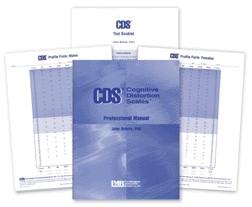
Cognitive Distortion Scales cds
For: Assess negative thinking patterns that interfere with optimal functioning in ages 18 years and older
Reading Level: Adult - Elder Adult
Format: Paper-and-Pencil
Length: 10-15 minutes to administer; 5 minutes to score
Scoring: Hand Scored
Printed Kits
Click to browse products
CDS Kit
Author
John Briere, PhD
Description
The CDS is a 40-item, self-assessment of cognitive distortions for adults ages 18 years and older. The CDS scales reflect five types of cognitive distortion:
Self-Criticism (SC) -Low self-esteem and self-devaluation as expressed in the tendency to criticise or devalue oneself.
Self-Blame (SB) -Extent to which the respondent blames himself or herself for negative, unwanted events in his or her life, including events outside the respondent’s control.
Helplessness (HLP) -Perception of being unable to control important aspects of one’s life.
Hopelessness (HOP) -Extent to which the respondent believes that the future is bleak and that he or she is destined to fail
Preoccupation With Danger (PWD) -Tendency to view the world, especially the interpersonal domain, as a dangerous place.
CDS materials include the Professional Manual, the Test Booklet, and the Profile Form. The Professional Manual provides information on administration, scoring, interpretation, psychometric characteristics, normative data on the standardisation sample, as well as data from sub-samples of psychotherapy outpatients.
The carbonless test booklet can be administered in 10-15 minutes to individuals or groups. Respondents use a 5-point scale to rate the frequency of occurrence of each item during the previous month. The CDS requires only minimal (5th grade) reading level. The items are hand scored to determine scale scores. Scoring takes only 5 minutes.
The CDS profile form allows conversion of raw scale scores to T scores based on the gender of the respondent. The normative sample included 611 individuals from the general population. A profile graph can be drawn to portray the respondent’s scores relative to the scores of the general population.
The CDS has demonstrated construct, convergent, and discriminant validity in both the general population and in clinical samples. Studies suggest that individuals with a history of child abuse or later personal trauma are especially likely to score in the clinical range on the CDS scales. Data presented in the CDS Professional Manual support use of this instrument in clinical and non-clinical contexts with adults who have no significant trauma history and those who have been traumatised.
NB: Prices are in Australian dollars inclusive of GST. NZ customers need to log in to view ex-GST prices.
 NZ
NZ




